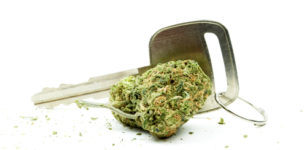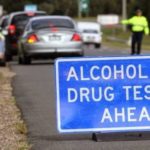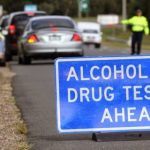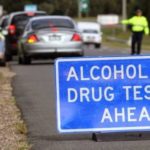NSW Drug Driving Laws Are Unfair and Do Not Deter

This state’s unfair drug driving laws were a major reason why former Lismore magistrate David Heilpern retired.
Over the last half decade or so, the judicial officer had built up a reputation across the Northern Rivers region for his just rulings in relation to roadside drug testing cases.
Heilpern’s classic judgements are well-known. In 2016, the then magistrate found Joseph Carrall not guilty of drug driving, as he’d last smoked cannabis nine days prior to testing. While Nicole Spackman was found not guilty of cannabis driving last year, as she’d tested positive due to passive smoking.
The Northern Rivers region has long been a focal point of the NSW police roadside drug testing (RDT) regime. And from around 2015 onwards, the Lismore courthouse, where Heilpern used to practice, was dealing with a backlog of cannabis-related drug driving cases.
The reason why Heilpern described these laws as “nonsensical and cruel” in a recent article in the Echo, is that rather than testing for impairment, the devices used by police test for mere traces of four specific drugs, meaning a driver can test positive, without being under the influence.
And a recently released UNSW paper on all Australian drug driving laws again shines a light on these unjust roadside regimes, which operate as a covert means of penalising people for using illicit drugs, instead of setting up a legitimate system that promotes road safety.
An overview of Australian laws
The UNSW Drug Policy Modelling Program paper Drug Driving Laws in Australia: What Are They and Why Do They Matter? was put together by NDARC researchers Vivienne Moxham-Hall and Dr Caitlin Hughes.
The pair have produced a snapshot of drug driving laws from all Australian states and territories as of January this year. And the academics note that this country was the first nation to enact roadside drug testing laws, with Victoria being the first jurisdiction in 2003.
“The goal of drug driving laws is to improve road safety and more explicitly to reduce the number of motor vehicle accidents where illicit drugs are involved,” the paper outlines, adding that these laws are supposed to mimic the laws that apply to random breath testing for alcohol.
Released in May, the UNSW paper differs from previous studies in that the researchers consider the implications of all drug driving laws, which include driving under the influence (DUI), driving while impaired (DWI), as well as Victoria’s combined drug and alcohol laws.
An outline of RDT in NSW
Roadside drug testing laws in this state are contained in the Road Transport Act 2013 (NSW) (the Act). Section 111 of the Act stipulates that it’s a crime to drive with the presence of a prescribed illicit drug in a person’s “oral fluid, blood or urine”.
Since the NSW regime’s inception in 2007, the prescribed illicit drugs tested for have been MDMA, amphetamines and THC: the psychoactive component of cannabis. And due to community pressure, cocaine was added to the list of select drugs in May last year.
In NSW, as in the majority of other jurisdictions, an initial oral fluid sample is taken from a driver on the side of the road. And the tiniest traces of these select drugs can result in a positive test. When a drug does show up, then a second salvia sample is sent off for a subsequent laboratory test.
Unlike in some other states, prison time doesn’t apply to RDT offences in NSW. And as of July last year, first time detected drivers are simply served with an infringement notice of $572, along with having their driver licence automatically disqualified for three months.
But, if a driver opts to contest the matter in court, they then face up to 6 months licence disqualification, a fine of up to $2,200 and a criminal conviction. While a repeat offender receives an automatic 6 month disqualification, a fine of up to $3,300, as well as a conviction.
Driving under the influence
The other type of drug driving laws in NSW are DUI laws, which fall under section 112 of the Act. These outline that “a person must not, while under the influence of alcohol or any other drug”, drive a vehicle, sit and attempt to start one, or sit in the seat next to a learner who’s driving.
The maximum penalty for a first time offender is 18 months imprisonment, a fine of $3,300 and driver licence cancellation of up to 3 years. Repeat offenders face penalties of up to 24 months in prison, a fine of $5,500 and a licence cancellation period of 5 years.
As the UNSW researchers set out “DUI laws require noticeable signs of impaired driving for police to pull the driver over”. Although, impairment isn’t defined in law. They also note that this state has average fine amounts, but comparatively high custodial sentences and disqualification periods.
Zero tolerance = less deterrence
The UNSW researchers point out that zero tolerance RDT laws raise issues around infringing upon people’s civil liberties versus increasing road safety.
However, the implicit unfairness involved in the application of these laws leads to questions as to whether they’re resulting in safer roads.
Currently, as shown in court, people are punished for traces of illicit substances in their systems, which have sometimes been taken days prior to testing – meaning they’re not driving high – while others have tested positive for traces present via means other than purposefully consuming drugs.
As pointed out by researchers in a 2017 paper, the 1982 introduction of random breath testing (RBT) for alcohol in NSW, turned the common practice of drink driving into a “highly stigmatised criminal behaviour,” thus improving road safety.
The reason for this is that RBT is based upon blood alcohol concentration, which means police test for scientifically proven levels of alcohol in the blood that reveal whether a driver is impaired and therefore, poses a danger to others on the road.
However, because of the flawed premise Australia’s current RDT laws are based upon, they don’t have the potential to do the same. At present, these laws are being used as a backdoor method to punish citizens for illegal drug use.
Therefore, they’re not respected, and nor do go very far to improving road safety.
These laws leave us with a situation where a regular drinker will skip that extra glass of booze to avoid RBT detection, whereas for a regular drug user, there’s less deterrent to having a joint right before driving if they’re likely to test positive regardless.
Going to court for a traffic offence?
If you are going to court for a traffic offence, call or email Sydney Criminal Lawyers anytime to arrange a free first consultation with an experienced, specialist traffic lawyer who will accurately advise you of your options, the best way forward, and fight for the optimal outcome in your specific situation.







